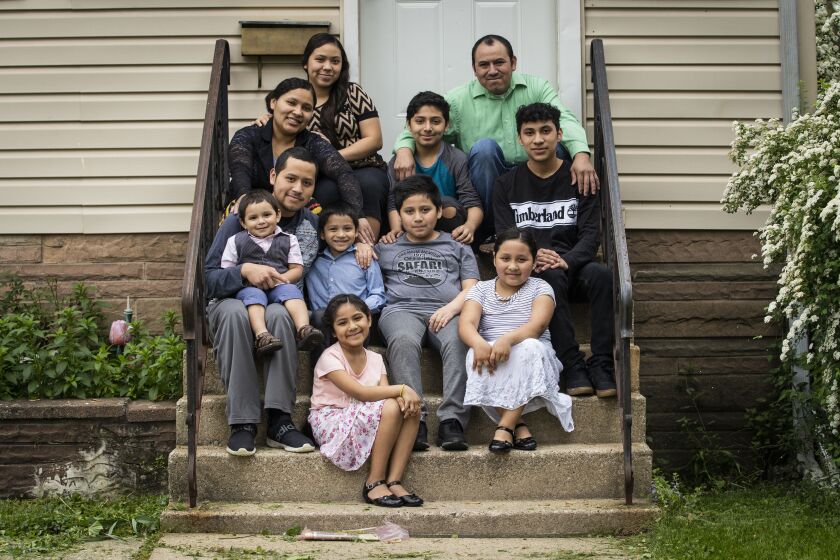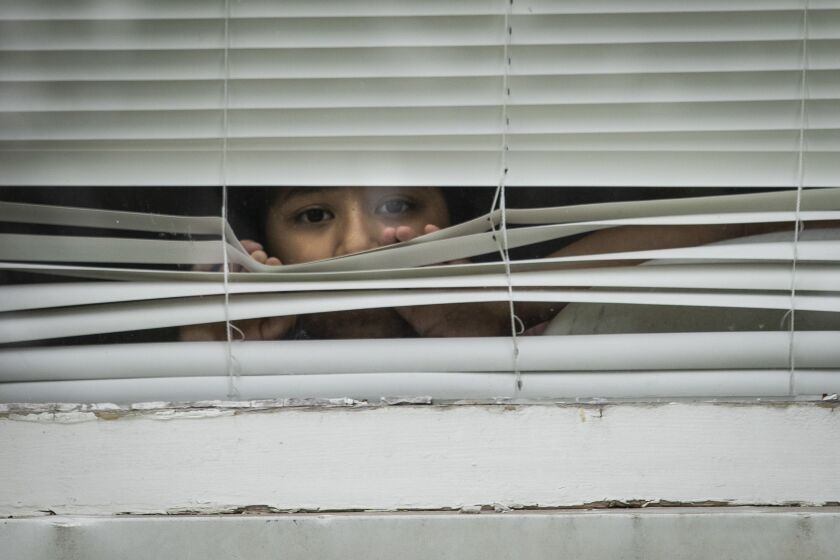Genesis Rivera has been cooped up in her bedroom for two weeks and counting.
The 18-year-old tested positive for the coronavirus May 12, days after her mom’s oldest nephew, Jose Luis Oliva, came home from work with a fever.
After reading up on how to manage COVID-19 symptoms and how to stop the virus from spreading, the Whitney Young High School senior took it upon herself to track Oliva’s every move in the Little Village apartment they shared with her parents.
“I became my uncle’s caretaker,” Rivera said, referring to Oliva, who has lived with the family since Rivera was 6. “I was the one giving him food, and every time he used the restroom, I wouldn’t let my parents use it until I disinfected it. I knew that because I’m young, [COVID-19] wouldn’t affect me as much as my parents.”
Oliva died May 20, 11 days after testing positive for the coronavirus. He was 54.
Rivera said she experienced mild symptoms of the disease but is now worried about passing it to her parents, who are also in their 50s.
“When I got the call from the doctor, I remember crying because I was fine with me being the one disinfecting stuff so that my parents were safe, but now that’s my mom’s job, and it’s scary knowing that I can be the one to give my parents the virus,” she said.
About 3,200 Latinos under 20 years old have tested positive for COVID-19 in Illinois. Meanwhile, fewer than 900 African Americans and 700 white people under 20 have tested positive. The virus is hitting young Latinos at a rate of one in 250 compared with one in 565 African Americans and one in 3,065 white people younger than 20.
Young people have generally been spared from the worst COVID-19 symptoms, and only three patients under 20 have died from the virus statewide.
But when a child or teenager tests positive, their parents can’t go back to work for at least two weeks. That’s hard for families living paycheck to paycheck, especially if they’re headed by undocumented immigrants and don’t qualify for a stimulus check.
“My husband’s a welder, and the company’s been good about him keeping his job, but we don’t know for sure what’s going to happen,” said Rivera’s mom, Elmy Sanchez.
Sanchez started losing her sense of smell earlier this week, a sign that perhaps she’s now contracted the virus.
The family plans to get tested again Monday.
“I have faith in God,” Sanchez said. “We’re not leaving the house until we get tested again.”
Bringing home more than a paycheck
Latinos are more likely than other racial or ethnic groups to have jobs that aren’t conducive to working from home, like food service and manufacturing, where crowded conditions make it easy for the virus to jump from person to person.
Majority Latino neighborhoods with high crowding rates — measured by the number of households that have more occupants than rooms — also have some of the highest COVID-19 infection rates, according to ProPublica Illinois.
“I’m seeing a lot of multigenerational homes, a lot of family living under the same roof and can’t socially isolate,” said Dr. Jasmine Saavedra, a pediatrician at Esperanza Health Centers in Brighton Park, a predominantly Latino neighborhood that’s in one of only five ZIP codes in the state with more than 2,500 confirmed coronavirus cases.
“For the most part, when it comes to kids and teenagers, it’s almost always someone in the family is an essential worker, and they bring it back and their children get it,” Saavedra said.
Latino teenagers who are essential workers are bringing the virus home with them, too.
Carlos Aviles, 18, tested positive May 18. He works eight-hour shifts, six days a week at a grocery store in Melrose Park.
Aviles lives in Maywood with his eight younger siblings and their parents. “My parents ended up testing positive, too,” he said. “I’m probably the one that gave it to them.”
“The first five days were the worst,” said Aviles’ mom, Cesiah Aviles. “I had a high fever, chills, headaches. At one point I had a lot of trouble breathing and fear started to seep in.”
Carlos Aviles and his dad split most of the bills and other household costs, but neither of them can go back to work until they get a doctor’s note saying they’re free of the virus.
“We’re worried about the bills because this is something unexpected, and they keep piling up no matter what,” Cesiah Aviles said. “I don’t know if we’ll have enough for the rent.”

Carlos Aviles holds his 1-year-old brother, Samuel, while sitting with his family on the steps of their home in Maywood. Starting in the back row, from the left, is Abigail, 16; father Tanislao, 38; mother Cesiah, 37; Bryan, 12; Uriel, 15; Carlos, 18; Samuel, 1; Isaac, 4; Moises, 11; Rachel, 9; and Rebecca Aviles, 7.
Ashlee Rezin Garcia/Sun-Times
‘The problem is that we don’t have enough tests’
About 36,000 Latinos in Illinois have tested positive for COVID-19, more than any racial or ethnic group in the state. Almost half of those cases are in Chicago, where one in 50 Latinos have tested positive for the virus.
Experts say that’s probably an undercount as areas with high a percentage of residents who are undocumented and lack health insurance — places like Little Village and Belmont Cragin — aren’t getting tested enough compared to other parts of the state, according to a recent study by The University of Chicago Poverty Lab.
Most people under the age of 16 are also unable to get tested for the virus, especially in low-income areas that are predominantly black and Latino. Carlos Aviles’s younger siblings, for example, showed symptoms of the disease but couldn’t get tested.
“The problem is that we don’t have enough tests,” said Dr. Susana Alvarez, a pediatrician at ACCESS Melrose Park Family Health Center and the primary doctor for the Aviles family. ACCESS Community Health started administering coronavirus tests to patients as young as 12 this past week.
Finding the virus among Latino kids is critical to getting control of the outbreak as the economy opens up and working families figure out their child care needs, said Dr. Allison Bartlett, an expert on pediatric infectious diseases at University of Chicago Medicine.
“With school being out and parents finding themselves pressured to go out and work again, many kids are going to end up being taken care of by grandma or another relative who’s at risk of getting really sick,” she said. “People are having to make a lot of difficult decisions.”
Carlos Ballesteros is a corps member of Report for America, a not-for-profit journalism program that aims to bolster Sun-Times coverage of Chicago’s South Side and West Side.







